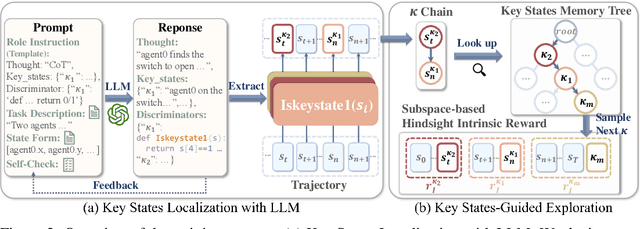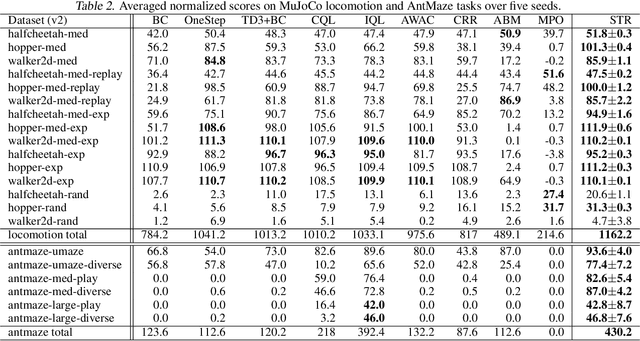Yixiu Mao
Small Generalizable Prompt Predictive Models Can Steer Efficient RL Post-Training of Large Reasoning Models
Feb 02, 2026Abstract:Reinforcement learning enhances the reasoning capabilities of large language models but often involves high computational costs due to rollout-intensive optimization. Online prompt selection presents a plausible solution by prioritizing informative prompts to improve training efficiency. However, current methods either depend on costly, exact evaluations or construct prompt-specific predictive models lacking generalization across prompts. This study introduces Generalizable Predictive Prompt Selection (GPS), which performs Bayesian inference towards prompt difficulty using a lightweight generative model trained on the shared optimization history. Intermediate-difficulty prioritization and history-anchored diversity are incorporated into the batch acquisition principle to select informative prompt batches. The small predictive model also generalizes at test-time for efficient computational allocation. Experiments across varied reasoning benchmarks indicate GPS's substantial improvements in training efficiency, final performance, and test-time efficiency over superior baseline methods.
Enhancing Generative Auto-bidding with Offline Reward Evaluation and Policy Search
Sep 19, 2025Abstract:Auto-bidding is an essential tool for advertisers to enhance their advertising performance. Recent progress has shown that AI-Generated Bidding (AIGB), which formulates the auto-bidding as a trajectory generation task and trains a conditional diffusion-based planner on offline data, achieves superior and stable performance compared to typical offline reinforcement learning (RL)-based auto-bidding methods. However, existing AIGB methods still encounter a performance bottleneck due to their neglect of fine-grained generation quality evaluation and inability to explore beyond static datasets. To address this, we propose AIGB-Pearl (\emph{Planning with EvAluator via RL}), a novel method that integrates generative planning and policy optimization. The key to AIGB-Pearl is to construct a non-bootstrapped \emph{trajectory evaluator} to assign rewards and guide policy search, enabling the planner to optimize its generation quality iteratively through interaction. Furthermore, to enhance trajectory evaluator accuracy in offline settings, we incorporate three key techniques: (i) a Large Language Model (LLM)-based architecture for better representational capacity, (ii) hybrid point-wise and pair-wise losses for better score learning, and (iii) adaptive integration of expert feedback for better generalization ability. Extensive experiments on both simulated and real-world advertising systems demonstrate the state-of-the-art performance of our approach.
Fast and Robust: Task Sampling with Posterior and Diversity Synergies for Adaptive Decision-Makers in Randomized Environments
Apr 27, 2025Abstract:Task robust adaptation is a long-standing pursuit in sequential decision-making. Some risk-averse strategies, e.g., the conditional value-at-risk principle, are incorporated in domain randomization or meta reinforcement learning to prioritize difficult tasks in optimization, which demand costly intensive evaluations. The efficiency issue prompts the development of robust active task sampling to train adaptive policies, where risk-predictive models are used to surrogate policy evaluation. This work characterizes the optimization pipeline of robust active task sampling as a Markov decision process, posits theoretical and practical insights, and constitutes robustness concepts in risk-averse scenarios. Importantly, we propose an easy-to-implement method, referred to as Posterior and Diversity Synergized Task Sampling (PDTS), to accommodate fast and robust sequential decision-making. Extensive experiments show that PDTS unlocks the potential of robust active task sampling, significantly improves the zero-shot and few-shot adaptation robustness in challenging tasks, and even accelerates the learning process under certain scenarios. Our project website is at https://thu-rllab.github.io/PDTS_project_page.
Beyond Any-Shot Adaptation: Predicting Optimization Outcome for Robustness Gains without Extra Pay
Jan 19, 2025



Abstract:The foundation model enables fast problem-solving without learning from scratch, and such a desirable adaptation property benefits from its adopted cross-task generalization paradigms, e.g., pretraining, meta-training, or finetuning. Recent trends have focused on the curation of task datasets during optimization, which includes task selection as an indispensable consideration for either adaptation robustness or sampling efficiency purposes. Despite some progress, selecting crucial task batches to optimize over iteration mostly exhausts massive task queries and requires intensive evaluation and computations to secure robust adaptation. This work underscores the criticality of both robustness and learning efficiency, especially in scenarios where tasks are risky to collect or costly to evaluate. To this end, we present Model Predictive Task Sampling (MPTS), a novel active task sampling framework to establish connections between the task space and adaptation risk landscape achieve robust adaptation. Technically, MPTS characterizes the task episodic information with a generative model and predicts optimization outcome after adaptation from posterior inference, i.e., forecasting task-specific adaptation risk values. The resulting risk learner amortizes expensive annotation, evaluation, or computation operations in task robust adaptation learning paradigms. Extensive experimental results show that MPTS can be seamlessly integrated into zero-shot, few-shot, and many-shot learning paradigms, increases adaptation robustness, and retains learning efficiency without affording extra cost. The code will be available at the project site https://github.com/thu-rllab/MPTS.
Latent Reward: LLM-Empowered Credit Assignment in Episodic Reinforcement Learning
Dec 15, 2024



Abstract:Reinforcement learning (RL) often encounters delayed and sparse feedback in real-world applications, even with only episodic rewards. Previous approaches have made some progress in reward redistribution for credit assignment but still face challenges, including training difficulties due to redundancy and ambiguous attributions stemming from overlooking the multifaceted nature of mission performance evaluation. Hopefully, Large Language Model (LLM) encompasses fruitful decision-making knowledge and provides a plausible tool for reward redistribution. Even so, deploying LLM in this case is non-trivial due to the misalignment between linguistic knowledge and the symbolic form requirement, together with inherent randomness and hallucinations in inference. To tackle these issues, we introduce LaRe, a novel LLM-empowered symbolic-based decision-making framework, to improve credit assignment. Key to LaRe is the concept of the Latent Reward, which works as a multi-dimensional performance evaluation, enabling more interpretable goal attainment from various perspectives and facilitating more effective reward redistribution. We examine that semantically generated code from LLM can bridge linguistic knowledge and symbolic latent rewards, as it is executable for symbolic objects. Meanwhile, we design latent reward self-verification to increase the stability and reliability of LLM inference. Theoretically, reward-irrelevant redundancy elimination in the latent reward benefits RL performance from more accurate reward estimation. Extensive experimental results witness that LaRe (i) achieves superior temporal credit assignment to SOTA methods, (ii) excels in allocating contributions among multiple agents, and (iii) outperforms policies trained with ground truth rewards for certain tasks.
Doubly Mild Generalization for Offline Reinforcement Learning
Nov 13, 2024



Abstract:Offline Reinforcement Learning (RL) suffers from the extrapolation error and value overestimation. From a generalization perspective, this issue can be attributed to the over-generalization of value functions or policies towards out-of-distribution (OOD) actions. Significant efforts have been devoted to mitigating such generalization, and recent in-sample learning approaches have further succeeded in entirely eschewing it. Nevertheless, we show that mild generalization beyond the dataset can be trusted and leveraged to improve performance under certain conditions. To appropriately exploit generalization in offline RL, we propose Doubly Mild Generalization (DMG), comprising (i) mild action generalization and (ii) mild generalization propagation. The former refers to selecting actions in a close neighborhood of the dataset to maximize the Q values. Even so, the potential erroneous generalization can still be propagated, accumulated, and exacerbated by bootstrapping. In light of this, the latter concept is introduced to mitigate the generalization propagation without impeding the propagation of RL learning signals. Theoretically, DMG guarantees better performance than the in-sample optimal policy in the oracle generalization scenario. Even under worst-case generalization, DMG can still control value overestimation at a certain level and lower bound the performance. Empirically, DMG achieves state-of-the-art performance across Gym-MuJoCo locomotion tasks and challenging AntMaze tasks. Moreover, benefiting from its flexibility in both generalization aspects, DMG enjoys a seamless transition from offline to online learning and attains strong online fine-tuning performance.
Offline Reinforcement Learning with OOD State Correction and OOD Action Suppression
Oct 28, 2024Abstract:In offline reinforcement learning (RL), addressing the out-of-distribution (OOD) action issue has been a focus, but we argue that there exists an OOD state issue that also impairs performance yet has been underexplored. Such an issue describes the scenario when the agent encounters states out of the offline dataset during the test phase, leading to uncontrolled behavior and performance degradation. To this end, we propose SCAS, a simple yet effective approach that unifies OOD state correction and OOD action suppression in offline RL. Technically, SCAS achieves value-aware OOD state correction, capable of correcting the agent from OOD states to high-value in-distribution states. Theoretical and empirical results show that SCAS also exhibits the effect of suppressing OOD actions. On standard offline RL benchmarks, SCAS achieves excellent performance without additional hyperparameter tuning. Moreover, benefiting from its OOD state correction feature, SCAS demonstrates enhanced robustness against environmental perturbations.
Choices are More Important than Efforts: LLM Enables Efficient Multi-Agent Exploration
Oct 03, 2024



Abstract:With expansive state-action spaces, efficient multi-agent exploration remains a longstanding challenge in reinforcement learning. Although pursuing novelty, diversity, or uncertainty attracts increasing attention, redundant efforts brought by exploration without proper guidance choices poses a practical issue for the community. This paper introduces a systematic approach, termed LEMAE, choosing to channel informative task-relevant guidance from a knowledgeable Large Language Model (LLM) for Efficient Multi-Agent Exploration. Specifically, we ground linguistic knowledge from LLM into symbolic key states, that are critical for task fulfillment, in a discriminative manner at low LLM inference costs. To unleash the power of key states, we design Subspace-based Hindsight Intrinsic Reward (SHIR) to guide agents toward key states by increasing reward density. Additionally, we build the Key State Memory Tree (KSMT) to track transitions between key states in a specific task for organized exploration. Benefiting from diminishing redundant explorations, LEMAE outperforms existing SOTA approaches on the challenging benchmarks (e.g., SMAC and MPE) by a large margin, achieving a 10x acceleration in certain scenarios.
Robust Fast Adaptation from Adversarially Explicit Task Distribution Generation
Jul 28, 2024



Abstract:Meta-learning is a practical learning paradigm to transfer skills across tasks from a few examples. Nevertheless, the existence of task distribution shifts tends to weaken meta-learners' generalization capability, particularly when the task distribution is naively hand-crafted or based on simple priors that fail to cover typical scenarios sufficiently. Here, we consider explicitly generative modeling task distributions placed over task identifiers and propose robustifying fast adaptation from adversarial training. Our approach, which can be interpreted as a model of a Stackelberg game, not only uncovers the task structure during problem-solving from an explicit generative model but also theoretically increases the adaptation robustness in worst cases. This work has practical implications, particularly in dealing with task distribution shifts in meta-learning, and contributes to theoretical insights in the field. Our method demonstrates its robustness in the presence of task subpopulation shifts and improved performance over SOTA baselines in extensive experiments. The project is available at https://sites.google.com/view/ar-metalearn.
Supported Trust Region Optimization for Offline Reinforcement Learning
Nov 15, 2023



Abstract:Offline reinforcement learning suffers from the out-of-distribution issue and extrapolation error. Most policy constraint methods regularize the density of the trained policy towards the behavior policy, which is too restrictive in most cases. We propose Supported Trust Region optimization (STR) which performs trust region policy optimization with the policy constrained within the support of the behavior policy, enjoying the less restrictive support constraint. We show that, when assuming no approximation and sampling error, STR guarantees strict policy improvement until convergence to the optimal support-constrained policy in the dataset. Further with both errors incorporated, STR still guarantees safe policy improvement for each step. Empirical results validate the theory of STR and demonstrate its state-of-the-art performance on MuJoCo locomotion domains and much more challenging AntMaze domains.
 Add to Chrome
Add to Chrome Add to Firefox
Add to Firefox Add to Edge
Add to Edge